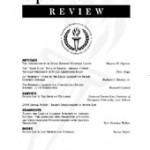New Issue of Marquette Sports Law Review
 Congratulations to the editors and staff of the Marquette Sports Law Review for producing Volume 19, No. 1 (Fall 2008), which is an excellent symposium issue on “Doping in Sports: Legal and Ethical Issues.” Information about how to obtain a copy of this issue is avaiable here. The symposium issue includes the following:
Congratulations to the editors and staff of the Marquette Sports Law Review for producing Volume 19, No. 1 (Fall 2008), which is an excellent symposium issue on “Doping in Sports: Legal and Ethical Issues.” Information about how to obtain a copy of this issue is avaiable here. The symposium issue includes the following:
DOPING IN SPORTS: LEGAL AND ETHICAL ISSUES
Federal Labor Law Obstacles to Achieving a Completely Independent Drug Program in Major League Baseball, Robert D. Manfred, Jr
Corruption: Its Impact on Fair Play, Richard H. McLaren

